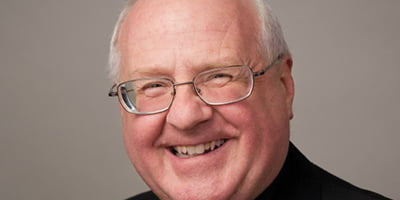
Father Mark Goldasich is the pastor of Sacred Heart parish in Tonganoxie. he has been editor of the Leaven since 1989.
by Father Mark Goldasich
Why would anyone write a book about Guy Lombardo’s orchestra, Aerosmith, Maroon 5, or Moon Taxi? And why in the world would there be a whole week devoted to it?
Do you know what I’m talking about? From Sept. 30- Oct. 6, people are supposed to celebrate the 30th anniversary of Band Books Week. By now, you should be shaking your head and saying, “That Father Mark is a dope. What’s being celebrated is Banned Books Week!”
If you can see the difference between “band” and “banned,” you’re more fortunate than some 32 million fellow Americans — about one in seven — who, according to a 2009 story in USA Today, would find it tough “to read anything more challenging than a children’s picture book or to understand a medication’s side effects listed on a pill bottle.” But that, as well as the whole issue of censorship that Banned Books Week tackles, are issues for other people to debate and solve.
What I want to emphasize about Banned Books Week is its celebration of the freedom to read. We don’t often consider our literacy a blessing. In fact, even though we have this gift of being able to read, many don’t take advantage of it.
Perhaps some of that goes back to our days as students. Learning to read is a skill that takes practice. And practice is often burdensome. Also, many of the textbooks we pored over were, shall we say, less than gripping.
We sometimes carry that bitter taste of “enforced” reading with us, long after we’ve left the classroom. And that’s a shame, because reading can open up whole new worlds for us, can make us think, and even help us to dream. As adults, we forget that we can pick and choose what we want to read.
Although taught how to read, we didn’t necessarily learn the art of reading. A clear, concise, 123-page book on the topic that I go back to from time to time is called “The Little Guide to Your Well-Read Life,” by Steve Leveen. Published in 2005 by Levenger Press, it had a very limited distribution and life, I suspect. (It is still available on amazon.com, however.) To me, the book did a neat job of illustrating its subtitle, “How to get more books in your life and more life from your books.”
In a nutshell, Leveen recommended making a list of books that you think you’d be interested in: by authors you may already know and like; about subjects you have an interest in (like learning more about the computer programs you already use); on issues you’d like to know more about (how to control anger or manage your time better); or ones that friends and family have recommended or that others are buzzing about.
I’d like to suggest one other type of book for that list. In this Year of Faith, set a goal of reading one spiritual book a month. If you’re worried about not having enough time, try this simple trick. See how many pages the book has, and then divide that by the number of days in the month that you’ll be reading it.
Here’s an example: My October book is Jesuit Father Jim Martin’s “A Jesuit Off-Broadway: Behind the Scenes with Faith, Doubt, Forgiveness, and More.” It has 230 pages. That number, divided by 31 days, means that I need to read just eight pages a night to finish it. Not so difficult, right? (And you can always read more than the minimum.)
Start October out with a good spiritual book. If you need suggestions, talk to your pastor or religious education director or browse Catholic publishers’ websites like: www.liguori.org, paulistpress. com, or catalog.fransciscan media.org.
And before you read, be sure to say a prayer for the persons who taught you how. Forgetting them might get you “band” from heaven.

